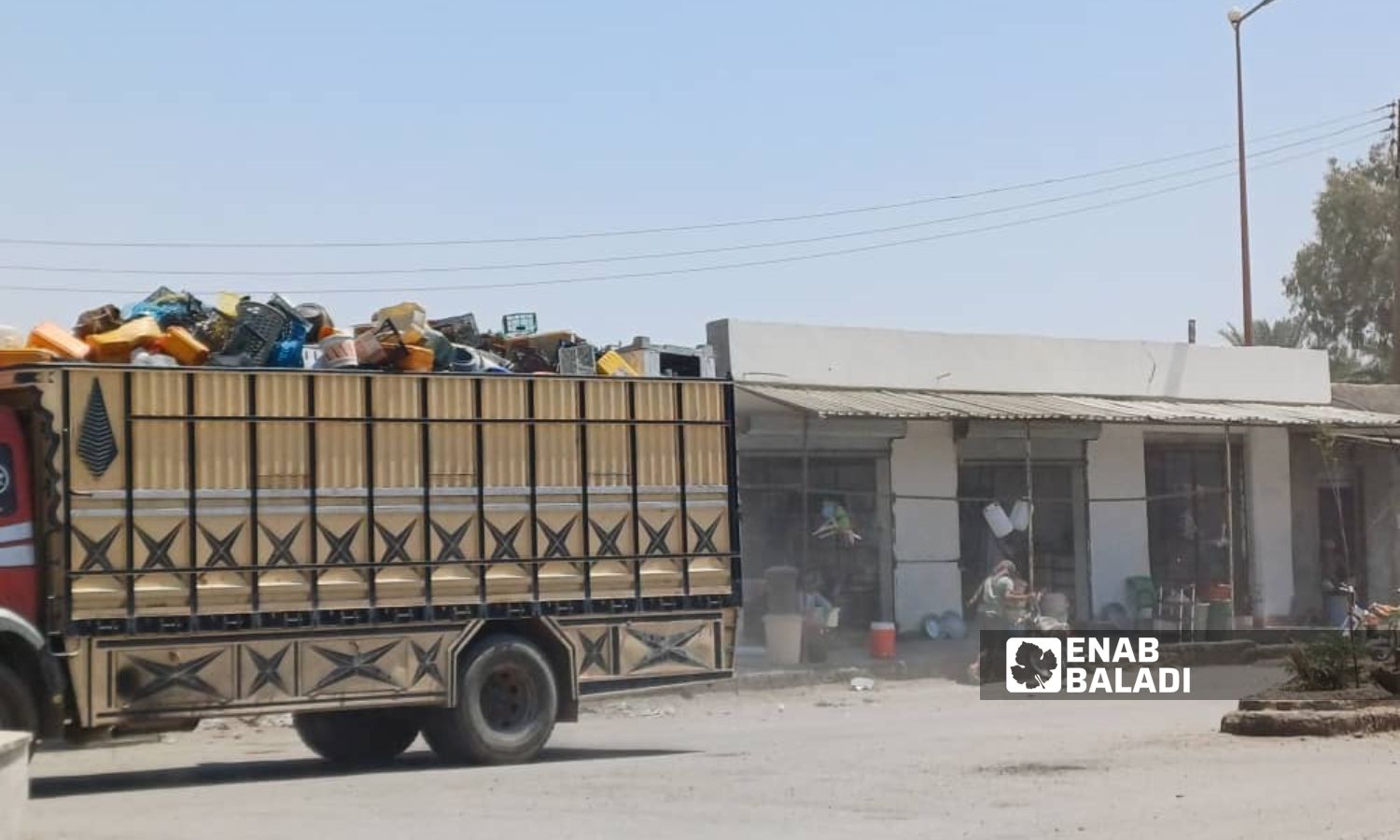



Owners of tankers transporting fuel for the Syrian Democratic Forces (SDF) in northeastern Syria have distanced themselves from their work and turned toward goods transportation following increased targeting of fuel tankers and the lack of protection by regional authorities.
The targeting of oil tankers in areas controlled by the SDF has been recurring for over a month, with the Islamic State claiming responsibility for some attacks while regional authorities remain unable to provide protection for these tankers.
Tanker owners in the countryside of Deir Ezzor face numerous difficulties, negatively impacting their work, leading some to switch to transporting commercial goods to avoid being targeted.
According to drivers speaking to Enab Baladi, the lack of security is one of the main challenges they face, as the SDF does not provide protection despite the heavy presence of their military forces in Deir Ezzor province since the start of clashes with regime-supported forces near the Euphrates River since August 7.
Amjad al-Daham (33 years old) quit working as a diesel tanker driver from the al-Omar field to Shaddadi and Ain al-Arab/Kobani after his truck was targeted by unknown assailants.
He mentioned that the tanker owner decided to stop working due to the losses incurred, and compensation was not provided by the fuel administration under the Autonomous Administration of North and East Syria (AANES) in Deir Ezzor.
He added that the regional authorities did not work to secure the roads despite repeated attacks in various areas under the Autonomous Administration, the political umbrella of the SDF.
Faisal al-Asaad, who owns three tankers transporting oil from the al-Omar field to various areas under the Autonomous Administration, has had to park his trucks for a month due to repeated attacks.
Al-Asaad was forced to replace the tankers with trailers for transporting goods and building materials to avoid being targeted and suffering losses as experienced by many in the fuel transport sector.
He told Enab Baladi that the SDF’s failure to provide protection for workers in this sector caused them to abandon their jobs. He stressed the need for patrols to accompany the tankers and ensure their exit from what drivers now call the “triangle of death,” an area extending from the Attal roundabout in the town of Shahil to the town of Jadid Akidat on the eastern bank of the Euphrates River in Deir Ezzor.
For Ahmad al-Toumah, working in commercial goods transport is less profitable but “safer,” as he describes it. He transports cement from the customs yard in Qamishli to Deir Ezzor, earning about $200 per trip, with two trips a week.
He told Enab Baladi that he resorted to goods transport after his oil tanker was targeted by unknown gunmen while passing through the village of Jadid Bakara about two months ago.
The Islamic State organization continues its attempts to benefit from the revenues of oil fields in the countryside of Deir Ezzor by targeting oil tankers and imposing taxes on some investors and workers in the oil transportation and sales sector.
The organization’s newspaper “Al-Naba” published an infographic detailing its attacks on oil tankers in areas controlled by the Autonomous Administration east of the Euphrates River and other areas under Syrian government control.
The newspaper claimed the organization had damaged 51 oil tankers across Syria and spilled the loads of another 15 tankers over 381 days.
According to the infographic titled “Economic War… Targeting PKK Tankers,” the organization carried out 16 attacks in Deir Ezzor province, three in Raqqa, one in Hama, and another in al-Hasakah.
The collection of royalties imposed by the Islamic State on oil investors in the eastern countryside of Deir Ezzor has been observed in several threats to investors that their properties would be burned if they did not pay the organization.
These threats related to money collection by the organization are concentrated in areas controlled by the SDF in the northern and eastern countryside of Deir Ezzor.
On June 24, members of the organization stormed an oil well in the Sayjan station in the eastern countryside of the province, setting fire to it because the investor refused to pay, according to North Press Agency.
if you think the article contain wrong information or you have additional details Send Correction